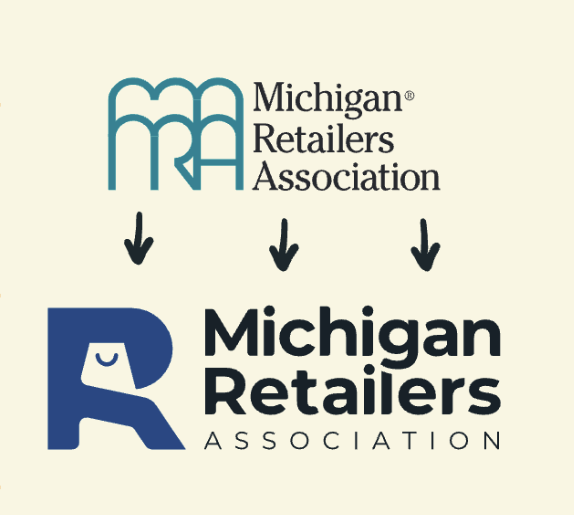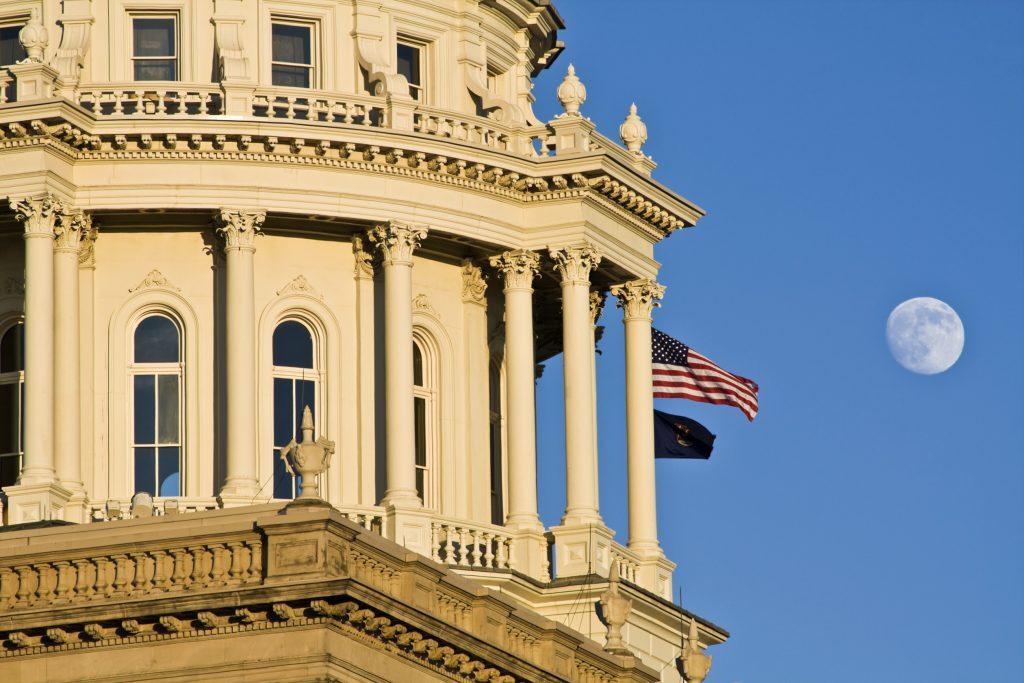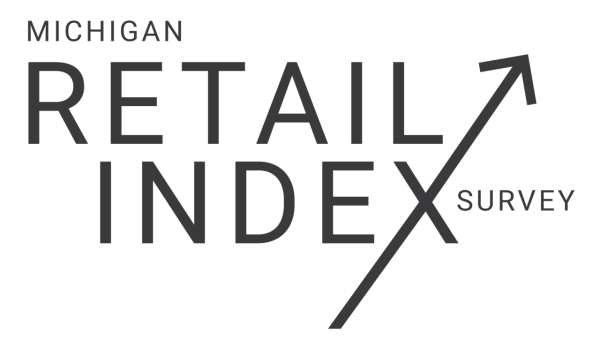Concealed carry without permit
The House narrowly approved legislation on Wednesday that would allow anyone, with or without a permit or training, to carry a concealed weapon. The legislation, HB 4416–4419, is intended to address when an individual is carrying a visible weapon but then inadvertently conceals it by putting on a coat or sweatshirt. Proponents of the bill refer to the current system as a “coat tax.” If approved by the Senate and signed into law, there would be no training or permit required for an individual to carry a weapon under clothing or in a purse or backpack. Law enforcement opposes the legislation and noted that 2,500 people have had applications to carry concealed weapons denied. The denials are often for individuals who have multiple drunk driving or stalking convictions. While individuals who have been denied a concealed carry permit may still own guns they cannot legally conceal them. Next step: heads to Senate committee for consideration
Tobacco 21 legislation introduced
MRA was not surprised to see legislation raising the legal age to purchase tobacco products from age 18 to 21 introduced yesterday. Backers of the “Tobacco 21” movement have been vocal about their intent to introduce state legislation further limiting access to tobacco products by minors. Two Michigan communities, Ann Arbor and Genesee County, approved local “Tobacco 21” ordinances. HB 4736 would raise the age for purchase of both tobacco products, tobacco paraphernalia, and e-cigarettes/vapor products to 21 as well as allow local governments to pass even stricter access laws.
Additionally, the bill raises the threshold to defend a charge and dramatically increases the fines for penalties. Under current law, a retailer must only have a written policy to prevent the sale of tobacco products to persons under age 18 to mount a defense of any charges of underage sales. The legislation would replace that standard to a retail employee demanded, was shown and reasonably relied on a government-issued photo ID that a person is age 21 or older before making the sale. Violations of the law would result in a state civil infraction of $1,000 – $2,500 for a first offense and $2,500 – $5,000 for a second or subsequent offense.
Other bills introduced as part of the package include additional restrictions. HB 4737 would require retailers or unclassified acquirers to store hookah tobacco away from food and behind the counter in an area that is only accessible with assistance from a retail employee. Similar to tobacco products, tobacco paraphernalia would no longer be able to be delivered via the mail or common carrier under HB 4738. Finally, HB 4739 would prohibit the sale of tobacco products from vending machines beginning July 1, 2018. While the legislation has bipartisan support, it is unclear whether the legislation will be brought up for discussion or vote. Unless the legislative schedule changes, legislators will likely run out of time to consider them before the summer recess, pushing the potential discussion into the fall or later. Next step: heads to House Regulatory Reform Committee for consideration
Anti-skimmer legislation reported
The Senate Agriculture Committee discussed and reported legislation that would require certain security measures to combat credit card skimmers on motor fuel pumps Thursday. SB 415 would allow a gas station to meet the new security measures by utilizing one or more of the following options: tamper-proof tape with customized graphics placed over the opening of the panel, a device to render the pump inoperable if the panel is opened without authorization, a scanner device that encrypts payment information (chip-enabled devices), changing the standard-supplied locks on pumps or any other means approved by the Department of Agriculture and Rural Development. A roll of customized security tape costs approximately $20-30 while changing the standard-issue locks costs approximately $10/lock.
In testimony, the department stated they have found more than 80 skimmers across Michigan on fuel pumps. Many gas stations have already taken steps to prevent skimmers from being installed on pumps. The legislation also prescribes enforcement measures. If a fuel pump is not properly protected, the owner has five days to install one or more security measures. If not installed after five days, the department may prohibit use of any noncompliant fuel pumps. Law enforcement and the department requested this legislation to ensure all fuel retailers are protecting customers’ data as much as possible. Next step: heads to the Senate floor for consideration
Prohibit local interference in the interview process
Legislation to add the interview process to the list of labor and benefit issues local governments cannot regulate was reported by the Senate Commerce Committee on Wednesday. SB 353 would prohibit local units of government from adopting, enforcing, or administering local ordinances, policies, or resolutions regulating the information an employer must request, require, or exclude during the interview process. Several cities and states (New York City, Philadelphia, Massachusetts, and Puerto Rico) have banned employers from asking questions about salary history or criminal backgrounds during the interview process. MRA-supported legislation that was approved in 2015 prohibited local units of government from regulating what can and cannot be on an employment application. SB 353 seeks to further strengthen that law by prohibiting local regulations on the interview process. Next step: heads to Senate floor for consideration
Airbnb to start collecting use tax July 1
In an announcement made this week, Airbnb, the San Francisco-based room and home rental company, said the company will begin collecting Michigan’s six percent use tax on July 1. The company allows travelers to rent homes or rooms directly from local homeowners. Prior to the agreement with the state, Airbnb directed local homeowners to pay any applicable rental taxes to the state and local communities. The use tax on occupancy was designed for hotels and professional travel industries. While many Michigan-based hosts paid the tax, approximately 32% of Airbnb hosts were simply sharing extra rooms or homes.
The Airbnb issue is reminiscent of what brought about the Main Street Fairness Act, which was passed to level the playing field between brick-and-mortar stores and online retailers like Amazon. The act allows the state to collect sales tax on purchases made through online retailers with a physical presence in Michigan. Many hotels and motels have argued that Airbnb participants have an unfair pricing advantage if they aren’t paying appropriate taxes.
MRA is still hoping Congress will take action to require state use and sales tax payments on all online purchases, no matter the businesses’ location. Online retail companies like Amazon.com are fighting the collection of sales tax from third party sellers who use the company’s platform to market and sell products.
Other important items to note:
GROCERY/CONVENIENCE
- Alcohol reforms: The Senate Regulatory Reform Committee quickly reported HB 4556–4559 on Wednesday without taking any testimony. The bills prohibit and set new penalties for the unauthorized sale, delivery or importation of beer or wine – including for personal use. They also limit retail displays to 120 days and allow employees of wholesalers to sample beer or wine for educational purposes on the wholesaler’s licensed premises.
- Beer keg tag elimination: Legislation to eliminate the requirement to tag certain kegs of beer was unanimously approved by the Senate on May 30. The bill, SB 372, removes a burdensome requirement for retailers to stick a label on a stainless-steel cylinder that is sweating and prohibits them from accepting the keg back if the label is missing. If the tag is missing the customer loses the $30 deposit and the retailer or brewer is out $100 for the keg. The bill was referred to the House Regulatory Reform Committee.
- Michigan Craft Beverage Council membership and duties: Legislation that seeks to expand membership on the newly renamed Michigan Craft Beverage Council (formerly known as the Grape and Wine Council) and the duties of the council was introduced as HB 4667–4668 on May 30 and brought up for a hearing on Wednesday. HB 4667 would expand to include a nonvoting position for a retailer with an SDM license or a restaurant that holds a Class C license. This is in addition to the current voting position on the council for a retailer holding an SDM license who sells Michigan wines or beers. Similar legislation was introduced in the Senate as SB 439-440 on Wednesday.
- Underage sting operations: Legislation that would ensure all underage sales of alcohol to minors are treated the same was introduced on Wednesday. SB 441 strikes language that makes selling alcohol to a minor during a sting operation a civil infraction with a fine up to $100 rather than a misdemeanor offense. Since the person selling the alcohol does not know if the customer is running a sting operation, the penalty should be the same as a real sale of alcohol to a minor, proponents say. The bill was referred to the Senate Regulatory Reform Committee.
PHARMACY
- 90-day prescriptions: Revised legislation to allow pharmacists to dispense a 90-day supply of medication so long as the prescription allows for enough refills to fill a 90-day supply was reported by the Senate Health Policy Committee on Tuesday. SB 360 ensures that pharmacists will not have to call the prescriber for approval as currently required by some insurance plans. The bill was modified to ensure pharmacies can also fill a longer-than 90-day supply if needed. It also includes language used in Ohio that requires consultation with the patient prior to dispensing more than a 30-day supply. MRA is hopeful the bill will receive a vote before legislators break for the summer.
- Opioid reforms: After lots of testimony and consideration, the Senate Health Policy finally approved several opioid-related reform bills on Tuesday. SB 47 and SB 166–167 would require physicians to check the Michigan Automated Prescription System (MAPS) before writing a prescription for pain medication containing opioids. Prescribers would have to have a bona fide physician-patient relationship before prescribing a Schedule 2 through 5 controlled substance under SB 270. Physicians would be required to provide information on substance abuse services to patients being treated for an opioid-related overdose under SB 273. New prescribing limits on opioids for chronic and acute pain sufferers would be implemented under SB 274. The six bills are now before the full Senate for consideration.
REGULATIONS
- Business Corporation Act changes: Legislation making various reforms to the Business Corporation Act was introduced as SB 442 yesterday. The bill was referred to the Senate Commerce Committee.
- Fireworks: Legislation introduced Tuesday as HB 4704 would modify the Fireworks Safety Act to give local governments greater control over the hours of use and operations of fireworks in their communities. The bill was referred to House Regulatory Reform Committee.
- Motor vehicle parts dealers: The House unanimously reported legislation on May 31 that makes technical fixes to a state law approved last year on used motor vehicles parts dealers. Public Act 112 of 2016 inadvertently affected scrap tire users, processors and haulers, creating duplicative record-keeping requirements. SB 158 seeks to remove the unintended duplicative reporting requirements without weakening the original intent of PA 112. The legislation was requested by the Michigan Department of Environmental Quality and now heads to the governor’s desk.
TAXES
- City income tax administrative procedures: The House Tax Policy Committee heard testimony on Wednesday on legislation that seeks to codify current administrative procedures used by the Michigan Department of Treasury when assisting the City of Detroit in collecting its city income tax. HB 4618 would formally give the Department of Treasury the same powers to collect city income taxes and ensure consistent application by mirroring the provisions in the Revenue Act to the City Income Tax Act, including voluntary disclosure and offer-in-compromise. MRA is seeking changes to ensure businesses will not be subject to audits by both the state and the city. MRA is also closely monitoring the legislation to ensure municipalities do not seek to extend tax collection liability to businesses who employ city residents but are located outside of the city limits.
- Sales/use tax on vehicle trade-in price difference: The House Tax Policy Committee also heard testimony on legislation approved in 2013 that allows car dealerships to only charge sales tax on the portion of the vehicle purchase paid with cash or credit and not on the trade-in value. The 2013 law eliminated the sales and use taxes on the difference over 25 years, fully phasing it out by 2039. Several bills, SB 94–95 and HB 4252–4253 seek to speed up that timeline over the next 10 years to fully eliminate the added tax by 2029. There was some discrepancy over how much the accelerated phase-out would cost the state and what impact that might have on schools and local governments who rely heavily on sales and use tax revenue to fund operations. The committee is expected to continue discussions and may vote next week.
OTHER
- Security alarm license exemptions: The House Communications and Technology Committee reported legislation that would allow businesses to install and service certain security systems without needing an electrician’s permit, security alarm license, and construction code permit. HB 4654–4655 reflect new technology that allows businesses to remotely monitor the premises through audio, video, or sensor detection. The bills will now be considered by the full House.






